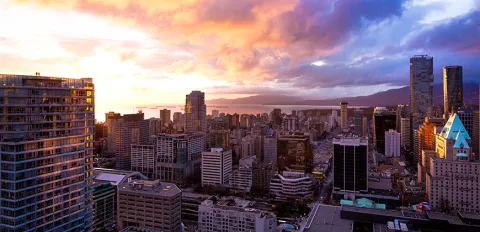Guest Speaker Series: Integration for Climate Solutions

- Master of Engineering Leadership
On Monday, May 3, Minister George Heyman held a seminar for Master of Engineering Leadership (MEL) students.
His seminar focused on the integration of engineering and business innovation, and explored this by connecting his extensive experience with the MEL student’s role as future industry leaders.
George Heyman was elected as the Member of Legislative Assembly (MLA) for Vancouver-Fairview in 2013 and re-elected in 2017 and 2020. As an MLA and Minister of Environment and Climate Change Strategy, Minister Heyman advocates for a more sustainable, modern and diverse economy. He is the co-recipient (alongside Dr. Andrew Weaver, MLA) of Canada's 2020 "Clean 16" Award for introducing the BC government's CleanBC climate and economic roadmap.
In the seminar for MEL students, Minister Heyman discussed the integration of government, business, and engineering necessary to achieve ambitious sustainability goals, achieving climate preparedness, adaptation, and technological innovation are among his top priorities.
During the seminar some of the main discussion areas encapsulated:
British Columbia’s clean transition
Minister Heyman recognized existing successful clean technologies in energy and construction in British Columbia. With examples of innovation connected to each of the MEL program specialisations offered, Minister Heyman focused on the industry changes that have made valuable impacts on building a low-carbon economy.
Referencing the MEL in Advanced Materials Manufacturing, Minster Heyman showed the links between BC’s electrical vehicle goals and expertise in advanced materials. By 2040, only new zero emission vehicles for light-duty transportation will be sold in BC. Interdisciplinary thinking and innovation in materials and manufacturing will assist the automotive industry transition.
Other forward-thinking solutions in BC include cost-effective low-carbon building solutions like low-carbon concrete or other high efficiency materials and energy retrofitting to meet net-zero building targets. Minister Heyman identified changes such as these to be solutions that require an integrated approach as green industry grows.
British Columbia has been calling on nature-based solutions in areas like flood management to better address the challenges that arise, and to build a cleaner path forward. For MEL in Integrated Water Management students, this means building greater understanding and expertise in ecology and watershed dynamics, as well as strong project management skills.
Rethink the future of your industry
Minister Heyman continued to explain how CleanBC, a climate pollution reduction plan implemented by the Government of British Columbia in 2018, presents an opportunity for MEL students to drive some solutions as sustainable business and engineering leaders.
Addressing climate change by cutting carbon pollution and challenging industry standards, CleanBC supports the innovative work from MEL students.
Other provincial projects minister Heyman touched upon were The CleanBC Industry Fund, whose goal is to invest in BC projects to apply clean technologies, assisting a green transition and reach committed goals of net-zero by 2050. Through discussion of this program, Minister Heyman also emphasized to MEL students the importance of community collaboration and integration of Indigenous communities. CleanBC recognizes the voice of those communities as an essential part of the integration that can break down siloes of industry.
“To reach these goals, there must be collaboration across sectors, government, and academia” said Minister Heyman.
Minister Heyman told the cohort to rethink and redefine what the province will look like years down the line. With a well-rounded background in climate conversation and policy, his seminar showed through these projects that engineering and business innovation are critically important and will continue to be one of the greatest assets to pursuing emissions reductions among other climate actions.
Integrative thinking is necessary to achieve sustainability goals
Minister Heyman’s seminar affirmed the importance of an integrated approach to addressing climate concerns to MEL students. Interdisciplinary thinking is key to a clean economy. Minister Heyman shared this sentiment with MEL students and highlighted that they should be at the forefront of these changes and that their ideas and expertise would be critical to shape the future.
Minister Heyman highlighted that “when it comes to climate change, young people will bear the consequences of the actions taken in the past.”
Therefore, the actions that MEL students take will be paramount.
Minister Heyman’s presentation gave MEL students an insight into British Columbia’s actions and goals for a clean future. He underscored the essential connections between engineering, business, and government. The presentation also offered important insight into cross-disciplinary thinking that will help break down industry siloes.
Are you ready to shape the future? Explore UBC’s Master of Engineering Leadership and how it prepares you to become a leader in your industry.